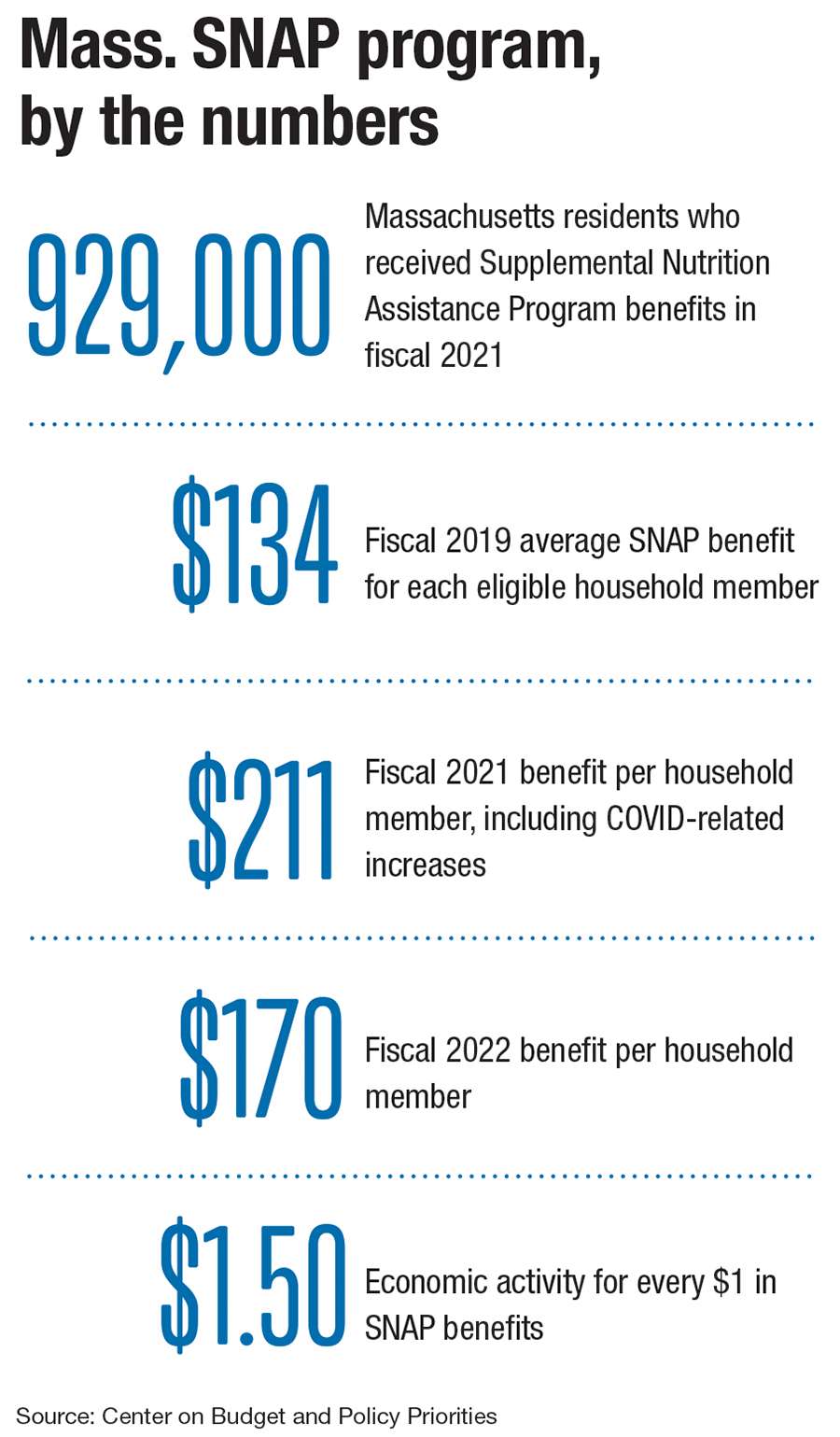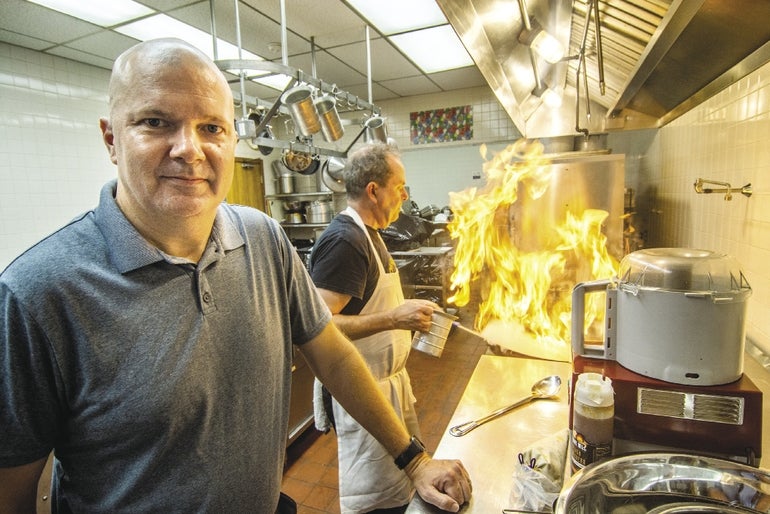
Qualifying Mass. restaurants will soon be able to accept government SNAP benefits for prepared meals
 PHOTO | EDD COTE
Shon Rainford, the director of the Worcester Regional Food Hub, is encouraging the entrepreneurs at his restaurant incubator to apply for the Restaurant Meals Program, so they can generate more revenue and reach a different slice of the community.
PHOTO | EDD COTE
Shon Rainford, the director of the Worcester Regional Food Hub, is encouraging the entrepreneurs at his restaurant incubator to apply for the Restaurant Meals Program, so they can generate more revenue and reach a different slice of the community.
Amidst a summer of persistent heat and economic uncertainty, Massachusetts will soon become the eighth state to operate the Restaurant Meals Program, a pilot program allowing select restaurants and food trucks to accept Supplemental Nutrition Assistance Program benefits.
The Massachusetts Department of Transitional Assistance has spent well over a year bringing this program to the commonwealth, which is expected to start in November. As a resource for low-income families and individuals, the department oversees SNAP alongside other economic and occupational support programs.
Once the RMP is up and running, SNAP recipients who are homeless, disabled, or 60 and above can opt to spend their benefits on prepared food from approved vendors. Brittany Mangini, associate commissioner for Food Security and Nutrition Programs, said DTA will use a homelessness indicator as well as records of age and disability status within the SNAP database to track client eligibility; identified individuals and their spouses need not take any additional steps to enroll.
At large, SNAP provides monthly stipends for food-purchasing assistance, dependent on several factors such as household size and income, through electronic benefit transfer cards issued to each client, who can then spend their benefits at grocery stores and farmer’s markets. SNAP doesn’t cover prepared meals, so the program is only as strong as an individual’s ability to store and cook ingredients.
“You can buy ham, you can buy cheese, you can buy bread, but you can't buy a ham-and-cheese sandwich,” said Steven Clark, president and CEO of the Massachusetts Restaurant Association. “Restaurants have the unique ability to meet the needs of certain communities.”
For those without the physical ability or means to store and assemble those groceries, the RMP can create an access point to nutritious and culturally appropriate meal options through local restaurants and food trucks, Mangini said.
Creating community connections
Mangini said her team will use a data-based approach to find restaurants that not only satisfy program requirements within priority neighborhoods, but also reflect a commitment to ethnic cuisine. They also want to make sure those choices are spread as evenly throughout the state as possible.
“A priority of this program is to reach a whole plethora of different restaurants, really encouraging restaurants that have strong cultural connections to different communities,” Mangini said.
At the Worcester Regional Food Hub, community connection is a central tenet. Director Shon Rainford said the Food Hub is constantly looking for ways to support low-income populations.
The Food Hub is a Worcester-based restaurant incubator supporting local food entrepreneurs while creating a platform for healthy and local eating. The organization’s vendors, or kitchen members, produce anything from homemade products such as hot sauces and granolas to cooked meals.
The hub has secured approval to accept SNAP for produce and food items.
A 2021 analysis of food insecurity in Worcester identified 20 food deserts, majority low-income areas where a significant portion of the population has limited access to healthy and affordable food options.
The hub cannot yet accept SNAP for prepared food, but Rainford is encouraging his kitchen members to apply for the upcoming program. The entrepreneurs work across a variety of locations and models – food trucks, food trailers, pop events with tents and tables – and serve nearly every type of ethnic cuisine.
For approved kitchen members, the program would mean access to a whole new source of revenue. Many of Rainford’s entrepreneurs are low income, and a good number sell to neighborhoods with a large percentage of SNAP recipients, so accepting benefits could make a real impact.
To qualify for the program, restaurants must be locally and privately owned, provide counter-based service and payment, and be independent of any conglomerate or multi-unit chain. Though SNAP payments are no different than traditional revenue, participating restaurants cannot charge service gratuity and sales or meals tax.
Once her team has made selections of which restaurants can partake in the pilot program, Mangini said the DTA will extend ongoing technical assistance to those restaurant owners while they enter the next phase of preparation.
With 75 applications and counting, the DTA is proceeding with cautious optimism, ahead of the Aug. 31 application deadline.
“We're not quite clear what kind of bandwidth the department would need to provide ongoing technical assistance for restaurants and participants, so our approach is to be a little bit more prudent and start small, then grow once we know exactly what running the program entails,” Mangini said.

Growing beyond the pilot
Though once the program is stable, she does hope it can evolve according to restaurant and SNAP participant interest.
The tax-exempt sales, Clark said, should not be a cause for restaurateur concern. Operators can produce records of their SNAP sales and verify certain transactions are immune from meals tax collections.
Restaurants can only benefit from opening their doors to an entirely new consumer base, an effect Clark hopes will encourage restaurants in the Massachusetts Restaurant Association to apply. He understands the industry leaves little time for tuning into outside news, so he included the program in an MRA newsletter.
“Success breeds success. I think once you start to see a couple of restaurants get in there, and it works, you'll see other restaurants say ‘Oh, I want to get in on that,’” Clark said.
Mangini said the program’s focus on locally owned establishments can energize the Massachusetts economy and potentiate economic opportunity for historically marginalized populations.
“The bonus part of this program is that it serves two populations,” Mangini said. “It serves the population of SNAP families who can now have access to prepared meals in a way that they historically haven't. But it also recognizes the power of a revenue source to support economic mobility for people of color.”
And if nothing else, it insists that nobody should be without access to a warm meal.









0 Comments